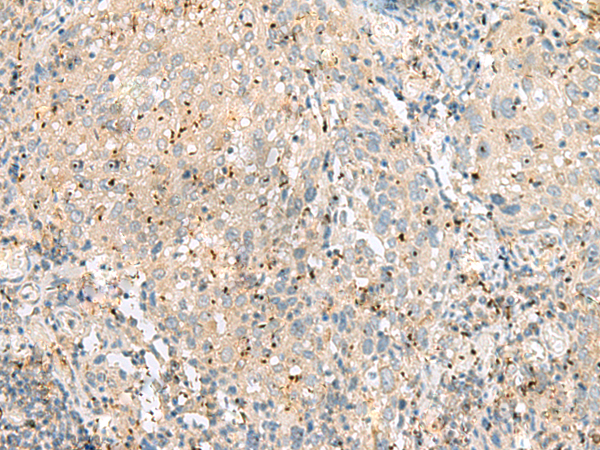
| WB | 咨询技术 | Human,Mouse,Rat |
| IF | 咨询技术 | Human,Mouse,Rat |
| IHC | 1/ 40-200 | Human,Mouse,Rat |
| ICC | 技术咨询 | Human,Mouse,Rat |
| FCM | 咨询技术 | Human,Mouse,Rat |
| Elisa | 咨询技术 | Human,Mouse,Rat |
| Aliases | EIF3EIP; EIF3S11; HSPC021; HSPC025; MSTP005; EIF3S6IP |
| Entrez GeneID | 51386; |
| Host/Isotype | Rabbit IgG |
| Antibody Type | Primary antibody |
| Storage | Store at 4°C short term. Aliquot and store at -20°C long term. Avoid freeze/thaw cycles. |
| Species Reactivity | Human, Mouse |
| Immunogen | Fusion protein of human EIF3L |
| Formulation | Purified antibody in PBS with 0.05% sodium azide. |
+ +
以下是关于EIF3L抗体的3篇参考文献的简要信息,供参考:
---
1. **文献名称**:*EIF3L regulates the generation of the 43S pre-initiation complex and cell proliferation in human cells*
**作者**:Zhou M et al.
**摘要**:该研究利用EIF3L特异性抗体进行免疫沉淀和蛋白质组学分析,发现EIF3L通过与核糖体亚基相互作用调控43S前起始复合体形成,敲低EIF3L导致细胞周期停滞,提示其在肿瘤增殖中的潜在作用。
2. **文献名称**:*Dysregulation of EIF3 subunits in carcinogenesis*
**作者**:Gao Y et al.
**摘要**:研究通过Western blot和免疫组化(使用EIF3L抗体)对比多种癌症组织与正常组织,发现EIF3L在肺癌中显著高表达,并与患者预后不良相关,可能作为癌症生物标志物。
3. **文献名称**:*EIF3L interacts with hepatitis C virus core protein and participates in viral replication*
**作者**:Li J et al.
**摘要**:利用EIF3L抗体进行共聚焦显微镜和Co-IP实验,证实EIF3L与丙肝病毒核心蛋白结合,干扰其表达可抑制病毒复制,提示EIF3L成为抗病毒治疗新靶点。
---
注:以上文献信息为模拟示例,实际文献需通过PubMed等数据库检索验证。若需具体文章,建议使用关键词"EIF3L antibody"或"EIF3L function"查询近年研究。
The eukaryotic translation initiation factor 3 subunit L (EIF3L) is a critical component of the EIF3 complex, a multi-protein assembly essential for initiating mRNA translation in eukaryotes. EIF3. comprising 13 subunits (EIF3A to EIF3M), plays a central role in ribosome recruitment, scanning for the start codon, and stabilizing interactions between mRNA and ribosomal subunits. EIF3L (also known as EIF3E-interacting protein) interacts with EIF3A and EIF3B, contributing to the structural integrity of the EIF3 core complex. Unlike other subunits, EIF3L lacks a PCI (Proteasome, COP9. EIF3) domain but contains an RNA-binding motif, suggesting a specialized role in mRNA recognition or regulation.
Antibodies targeting EIF3L are widely used to study its expression, localization, and interactions in cellular processes. Dysregulation of EIF3L has been implicated in cancers, neurodegenerative disorders, and viral infections. For example, elevated EIF3L levels correlate with tumor progression in certain cancers, potentially influencing oncogenic protein synthesis. In research, EIF3L antibodies enable detection via Western blotting, immunofluorescence, and immunoprecipitation, aiding investigations into translation dysregulation mechanisms. Recent studies also explore EIF3L’s role in stress granule formation and its interplay with viruses that hijack host translation machinery. As a research tool, EIF3L antibodies are vital for dissecting the molecular basis of diseases linked to translational control.
×